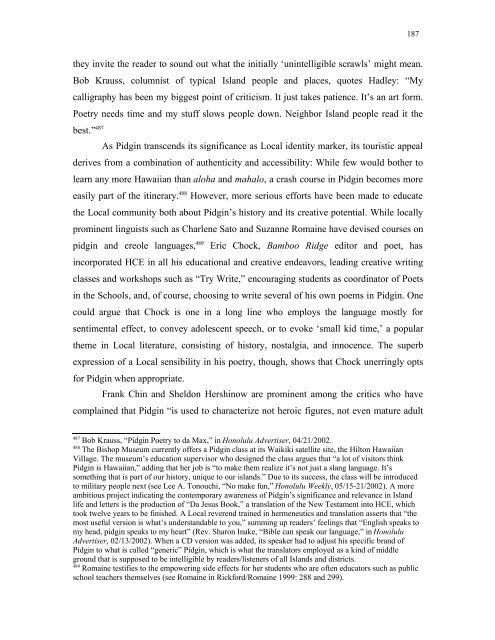A Paradise Lost - KOPS - Universität Konstanz
A Paradise Lost - KOPS - Universität Konstanz
A Paradise Lost - KOPS - Universität Konstanz
You also want an ePaper? Increase the reach of your titles
YUMPU automatically turns print PDFs into web optimized ePapers that Google loves.
they invite the reader to sound out what the initially ‘unintelligible scrawls’ might mean.<br />
Bob Krauss, columnist of typical Island people and places, quotes Hadley: “My<br />
calligraphy has been my biggest point of criticism. It just takes patience. It’s an art form.<br />
Poetry needs time and my stuff slows people down. Neighbor Island people read it the<br />
best.” 487<br />
As Pidgin transcends its significance as Local identity marker, its touristic appeal<br />
derives from a combination of authenticity and accessibility: While few would bother to<br />
learn any more Hawaiian than aloha and mahalo, a crash course in Pidgin becomes more<br />
easily part of the itinerary. 488 However, more serious efforts have been made to educate<br />
the Local community both about Pidgin’s history and its creative potential. While locally<br />
prominent linguists such as Charlene Sato and Suzanne Romaine have devised courses on<br />
pidgin and creole languages, 489 Eric Chock, Bamboo Ridge editor and poet, has<br />
incorporated HCE in all his educational and creative endeavors, leading creative writing<br />
classes and workshops such as “Try Write,” encouraging students as coordinator of Poets<br />
in the Schools, and, of course, choosing to write several of his own poems in Pidgin. One<br />
could argue that Chock is one in a long line who employs the language mostly for<br />
sentimental effect, to convey adolescent speech, or to evoke ‘small kid time,’ a popular<br />
theme in Local literature, consisting of history, nostalgia, and innocence. The superb<br />
expression of a Local sensibility in his poetry, though, shows that Chock unerringly opts<br />
for Pidgin when appropriate.<br />
Frank Chin and Sheldon Hershinow are prominent among the critics who have<br />
complained that Pidgin “is used to characterize not heroic figures, not even mature adult<br />
487 Bob Krauss, “Pidgin Poetry to da Max,” in Honolulu Advertiser, 04/21/2002.<br />
488 The Bishop Museum currently offers a Pidgin class at its Waikiki satellite site, the Hilton Hawaiian<br />
Village. The museum’s education supervisor who designed the class argues that “a lot of visitors think<br />
Pidgin is Hawaiian,” adding that her job is “to make them realize it’s not just a slang language. It’s<br />
something that is part of our history, unique to our islands.” Due to its success, the class will be introduced<br />
to military people next (see Lee A. Tonouchi, “No make fun,” Honolulu Weekly, 05/15-21/2002). A more<br />
ambitious project indicating the contemporary awareness of Pidgin’s significance and relevance in Island<br />
life and letters is the production of “Da Jesus Book,” a translation of the New Testament into HCE, which<br />
took twelve years to be finished. A Local reverend trained in hermeneutics and translation asserts that “the<br />
most useful version is what’s understandable to you,” summing up readers’ feelings that “English speaks to<br />
my head, pidgin speaks to my heart” (Rev. Sharon Inake, “Bible can speak our language,” in Honolulu<br />
Advertiser, 02/13/2002). When a CD version was added, its speaker had to adjust his specific brand of<br />
Pidgin to what is called “generic” Pidgin, which is what the translators employed as a kind of middle<br />
ground that is supposed to be intelligible by readers/listeners of all Islands and districts.<br />
489 Romaine testifies to the empowering side effects for her students who are often educators such as public<br />
school teachers themselves (see Romaine in Rickford/Romaine 1999: 288 and 299).<br />
187

















